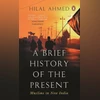A Brief History of the Present: Muslims in New India
Everything that is contained between the covers of this book is drawn from the author’s experience, which has been, and is, being “lived”; actually there’s no escaping this, sadly for no other reason but his “primary” identity. Yet, he belongs to that demographic majority of Indians that “grew up in the 1990s”, around one of the most significant watersheds in India’s polity and society — the demolition of the Babri Masjid and its prelude. But within that majority, he remains in the minority, both among his faith-based community as well as among those who share his beliefs. Despite the complex web of identities, the book is not a memoir and it leaves out most events of his life that most sensitive Indians would be able to fathom. Instead of talking about what he, his family and friends weathered over this period, Hilal Ahmed turns his analytical gaze to the developments that, in more ways than one, have transmogrified the nation.
The title, which appears at first glance to be intriguing, becomes more comprehensible when one focuses solely on the subtitle — Muslims in New India. Innumerable books can be written on the condition/plight/choices and/or compulsions of Muslims in today’s India. The author, however, has chosen an omnibus framework of contemporary reality from the standpoint of Muslims. The book is not an “entire” history of how things came to such a pass; for that any author would have to go well beyond even the 20th century. Instead, the book exhaustively examines events that have gravely altered the status and position of Muslims since 2014.
Mr Ahmed is a prolific commentator in the mainstream media, besides being an academic of repute. He has previously addressed several themes and developments in the book but in different format, scope and expanse. Over the years, unsurprisingly, he has been a steadfast critic of the Bharatiya Janata Party (BJP) and other organisations affiliated to its ideological fountainhead — the Rashtriya Swayamsevak Sangh (RSS). But unexpectedly, he has also been an unsparing detractor of those parties that Muslims cannot but vote for, because the majority of the community and innumerable more would not consider, even for a split second, voting for the BJP. Today’s India is driven by convenient binaries, leaving little option for people like the author to swim against the tide. Mr Ahmed’s opposition to the BJP and its associates is ideological. In contrast, his detraction of the “so-called” secular and democratic parties stems from their lack of “courage” (recall Sonia Gandhi’s concern at the Congress being labelled pro-Muslim), and more damningly, to their “laziness”. The author does not for a moment camouflage the fact that he is a practising Muslim. Yet at every step, in each line he writes, his divergence from the dominant thinking within the Muslim community is underscored.
This comes across unmistakably in that sub-section on Aurangzeb in which he examines various Muslim imaginations on the contentious Mughal emperor. Mr Ahmed argues that in debates and discussion on the emperor, even elementary questions such as whether Indian Muslims consider him a “symbol of their identity”, whether they hold on to his political legacy and whether Aurangzeb is “really seen as an uncontested Islamic figure” are ignored. Instead, two conflicting public images of Aurangzeb are pitted against each other: The Islamic tyrant and destroyer of temples and imposition of Shariat, against the pious but inclusive Muslim who donated land for temples. As against the Hindutva votaries’ belief that all Muslims admire the emperor and endorse his political vision, there is a section among secular adversaries of the Sangh Parivar who leave no stone unturned to depict him as tolerant and even secular while overlooking the destruction of temples. Mr Ahmed minces no words to establish that the emperor was never a hero to Muslims and instead he labels him a “problematic figure: An intolerant ruler, an untrustworthy son and brother, and an enemy of the universal message of Islam”.
The book talks about Muslims in New India, an idea publicised incessantly by India’s current political regime without explaining what exactly this means and how “new” India is different from “old” India. The author provides a sharp takedown of not just New India, but also two other phrases bearing Prime Minister Narendra Modi’s imprimatur — Mother of Democracy and Revdi, the latter based on the belief that welfarism gets converted into a slur if the adversary implements or promises what the author contends is little but dole handed out by a charitable ruler.
The book places contemporary Muslims within several backdrops: Historical, Cultural, Religious, Social (not as understood in cinema, its genre and studies) and Political. The author also examines the notion of “liberals” among the Muslims, a category to which he confesses to being a member. Mr Ahmed sub-divides liberal Muslims further: Into the “nationalist” from the pre-Independence era; the “progressive” ones with a tilt towards Marxism; the “socialist” one swearing by Lohia and Jayaprakash Narayan; and finally, the “cultural” or “secular” lot who may not be religious Muslims but still drape themselves with this identity.
)

)

















